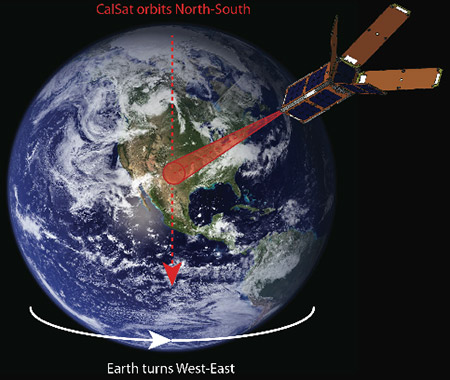Cosmology Prize Recognizes ‘Inventive’ Proposed Test of Fundamental Physics
Published Date
By:
- Susan Brown
Share This:
Article Content

The proposed satellite, CalSat, would follow a north-south polar orbit while sending beams of precise microwave signals toward Earth, covering the entire planet over time as it rotates west to east.
Two UC San Diego astrophysicists together with a colleague at Columbia University have been awarded a 2014 Buchalter Cosmology Prize for a paper proposing a way to significantly enhance cosmological measurements in a way that should enable sensitive tests of ideas fundamental to our understanding of physical laws. The paper by postdoctoral scholar Jonathan Kaufman, physics professor Brian Keating, and Bradley Johnson, professor of physics at Columbia, was posted to the online repository arXiv in September 2014.
The newly established prize “seeks to motivate and recognize innovative theoretical, observational, or experimental work in cosmology that has the potential to produce a breakthrough advance in our thinking.” Winners were announced at the winter meeting of the American Astronomical Society in Seattle today.
Modern physics assumes the laws of nature do not vary if the observer looks from another point in space or time. This constancy, known as Lorentz Invariance, has held up so far, Keating notes, “but we’ve been surprised before.”
Measurements of B-modes, or the twisting element of the polarization of the faint, pervasive radiation known as the cosmic microwave background, offer a test of that assumption. That is, a rotation of the axis of polarization would indicate a violation of Lorentz invariance over cosmological scales.
Although extremely accurate polarimeters have been deployed by experiments such as POLARBEAR, and are now making some of the most precise measurements yet, it’s not quite enough to distinguish apparent rotation of the signal that might originate with the instrument itself. To detect possible rotation in the polarization, they will need even more precise calibration.
Right now, most instruments calibrate their measurements using Tau A, a bright celestial object in the constellation Taurus. The authors propose using instead a tiny satellite that would send precise beams of polarized microwave radiation to Earth. Their satellite would send signals with five different millimeter wavelengths from a small instrument aboard a CubeSat — a kind of plug-and-play mini-satellite that can easily be launched with other missions — on a low-Earth polar orbit.
The proposed calibration satellite could be used with current instruments, such as POLARBEAR, that are searching for B-mode polarization, effectively turning them into probes for violations of Lorentz Invariance without the need to build instruments dedicated to this additional quest, the authors write.
The prize amount of $5,000 will be split equally among the three authors.
Share This:
Stay in the Know
Keep up with all the latest from UC San Diego. Subscribe to the newsletter today.



